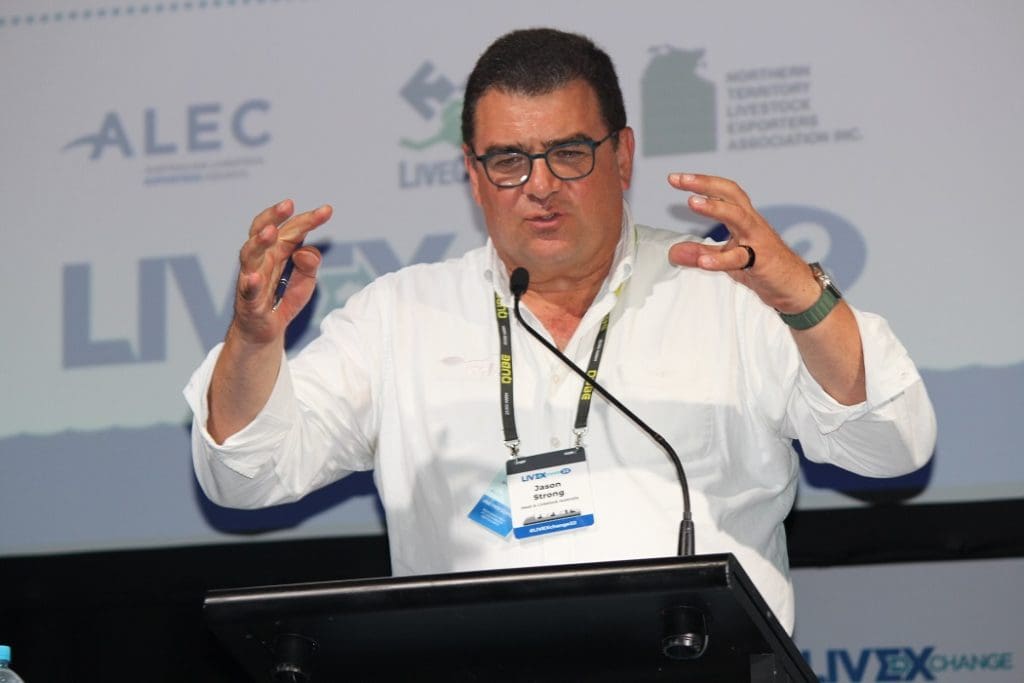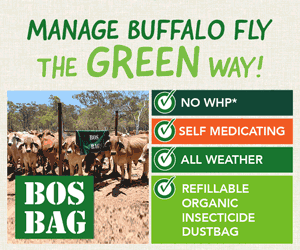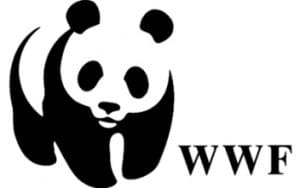
MLA managing director Jason Strong at the LIVEXchange 2022 conference in Darwin.
FORMER Meat & Livestock Australia managing director Richard Norton, his board and an anonymous ‘panda guy’ mate were lauded for their roles in the Australian red meat sector’s path to carbon neutrality, by incumbent MLA leader Jason Strong last week.
At the LIVEXchange 2022 conference in Darwin, Mr Strong, presented on ‘Red meat: solving the climate challenge’ and the pathway to CN30, the industry target of carbon neutrality by 2030.
Mr Strong said carbon neutrality by 2030, or CN30, was a goal set in 2017 at the MLA AGM and it had been interesting seeing the progression of how that’s perceived by the industry.
“And there’s that saying that success has many fathers but failure is an orphan.
“When people ask what’s the most important single thing that’s actually been done for the red meat sector around positioning ourselves in this climate space, it was Richard Norton standing up at the AGM and saying ‘based on the CSIRO report which says that with the right investment, research and development, and the right policy environment, the red meat sector can be carbon neutral in ten years.. and they set a goal of 2030,” Mr Strong said.
“At the time there were many people, and anybody who is really honest with themselves, probably all of us, certainly me, were pretty sceptical and thought ‘what a crazy thing to do’.
 “But it was incredibly brave and now the number of people that are very proud, grateful, appreciative of the fact that we’ve had a four or five year run in to an issue that’s now becoming very very important and probably more for others, it is an incredibly important thing for us to remember,” he said.
“But it was incredibly brave and now the number of people that are very proud, grateful, appreciative of the fact that we’ve had a four or five year run in to an issue that’s now becoming very very important and probably more for others, it is an incredibly important thing for us to remember,” he said.
“I think it is one of those demonstrations of what we do as an industry and how we can use our industry organisations like MLA to set ambitious goals to try and find ways to set us up in the best possible way that we can to deliver against those.
He said now with the broader global discussions on sustainability, the “run up” in the carbon space put the sector in “incredibly good shape” as how to be a good example of driving an improved relationship with the environment through measures that are largely productivity-driven.
“And that’s an important component of how I think about things going forward.
“Carbon neutrality, the CN30 goal, it doesn’t need to come at the cost of livestock numbers or sector productivity and it is actually as much about building and growing productivity to help provide those solutions as well.
He said this involved finding a suite of solutions to reduce sector emissions and for carbon storage.
“There isn’t going to be a silver bullet.”
He said five years ago the industry didn’t think it was possible to reduce ruminant methane emissions, but there were now multiple commercial products, with trials indicating some could achieve reductions of 90 percent through supplements.
“We’ll find ways as an industry to apply these things that give us benefit.”
Soil carbon and the panda guy
 On the breadth of views on soil carbon sequestration, Mr Strong spoke of unsolicited emails from two staff members with differing opinions that its potential was “overblown” versus “I think this actually might solve the whole problem all by itself.”
On the breadth of views on soil carbon sequestration, Mr Strong spoke of unsolicited emails from two staff members with differing opinions that its potential was “overblown” versus “I think this actually might solve the whole problem all by itself.”
Later that week he was talking to a mate who said the problem was that there was not enough evidence to support either of those views, “however, we believe there is something in this and it’s actually something we should focus on as an industry…”
Now years later Mr Strong said the sector knows that soil carbon sequestration is going to be helpful.
“But the really interesting thing is that the third guy I spoke to worked with WWF (World Wildlife Fund) … the most reasonable bloke I spoke to that week was the panda guy.
“So we’ve got to be really conscious of the breadth of views and let’s just be really clear that’s not where we go as a source of information as a starting point, we absolutely go with productivity in how we actually drive things forward,” he said.
He said his ‘panda guy’ story was a good reminder that it was early days and the solutions would be incredibly sophisticated, not easy but hard, and would take time and commitment.
“As an industry, we are further advanced down that path than anybody else.”
He said the industry is too often unfairly criticised or maligned, with cows unfairly maligned because they were recognisable.
Mr Strong said the most important message that could come from the 2022 United Nations Climate Change Conference COP27 meeting is that “animal agriculture didn’t create the problem, but we are absolutely part of the solution.”
“The Australian red meat sector is actually the gold standard for how an industry can be profitable and productive and create greater sustainability for the industry as far as longevity in its ability to produce high quality food for our customers and clients around the world and consumers, but also reduce our impact on the environment or impact that in a better way.”
“So how we go about telling that story will be incredibly important,” he said.
“But the message has to be: animal agriculture did not create this problem and it is absolutely part of the solution.
“It’s actually one of the best solutions, and it’s actually one of the only solutions that is already demonstrating how you can actually do that.”

A lot of the ‘solutions’ Jason Strong is alluding to have already been well researched and documented in past agricultural research. For example; legume addition to improved and native pastures was a major research and adoption focus by industry right through the latter half of the 20th century. Now legumes are hailed as important for methane reduction and should be adopted. Not new news. The importance of ruminants in the carbon cycle is supported by a lot of published research.It just requires adoption and acceptance by industry leaders and environmentalists as a done deal not a weakness to be exploited.
If Jason Strong found the unnamed/anonymous “Panda Man” reasonable he needs to do a whole lot more research.
WWF and fellow travellers operate to an (often unknown) agenda, they do not care about collateral damage and their method of operation is to suck-in “industry leaders” like Jason Strong.
Their lobbying, and that of their cohorts, and their entrenchment in the Queensland bureaucracy is causing real pain for those in livestock production in Queensland in particular, and probably in other states.
Queensland has a severe budgetary problem and yet they still have millions of dollars to spend on more expensive satellite technology to supposedly measure woody vegetation destruction, often woody weeds. Many more Reef Police to harass those who may be able to be made to look as if they are damaging the Great Barrier Reef have been employed since July.
The harassment is real, not reasonable nor affable.
Jason Strong needs to get out of Sydney more often, and take a closer look at policy, what it is based on and the real end point after a couple of disasters.
He also needs to talk about the biogenic Methane cycle.
Not sure we agree with your comment about the need for Jason Strong to get out of the office more, Joanne. Based solely on recent reports on Beef Central, we can confirm that in the past ten days he has been in Mt Isa (Agforce AGM), Roma today and tomorrow (Young Beef Producers’ Forum), Darwin Live Export Conference, and Tom Price Beef-Up forum in WA. Editor.
C’mon people, what about some feedback?
This is an interesting article, aimed right at the centre of the world’s biggest manmade problem (if you believe atmospheric CO2 is changing our climate). And it points to a solution you beef people can possibly provide.
I think I can see a path to the beef (and maybe other livestock) industry going carbon NEGATIVE while simultaneously expanding into more arid regions. This will be by integrating various forms of agriculture with photovoltaics, PV, encouraging, I hope, increased organic soil carbon which should improve grazing productivity. Agrisolar is generating much interest in the solar PV industry but I think multiple benefits will come from fully integrating the two industries. This will require a lot of work, much of it experimental but, as this article says,, all possibilities have to be explored.
Can anyone point me to the CSIRO article mentioned?
Rory
I believe this is the link to the article
https://www.sciencedirect.com/science/article/abs/pii/S0308521X19301258
“The Panda Guy” has sometimes been the code used by peak body leaders to refer to WWF employees who they have been approached by in often an affable manner but with a manipulative purpose. Jason Strong found his “panda guy” reasonable; well of course this person would appear friendly. But this hides WWF true purpose which is not at all friendly towards agriculture.
My guess that the majority of red meat producers were not consulted over the net zero adventure. Livestock is not the problem. They are a key part of the biogenic carbon cycle and add no new methane emissions.
Livestock are not the issue. They are Natures recyclers that convert grass into red meat. Grass that would otherwise decompose and still result in emissions.
Soil Carbon projects are a no regrets pathway to scalable sequestration, unlike tree planting schemes and woodlands thickening that comes at the cost of pasture production.
Soil Carbon increases moisture holding capacity, cation exchange, N cycling (and holding ability- like a reservoir), biological activity helping nutrient exchange with plant roots etc. Fodder Production increases with soil health. The key is management- and it does not have to be cell grazing!
Deep rooted perennial legumes like Desmanthus and Stylos have been found to sequester carbon deep into the soil profile.